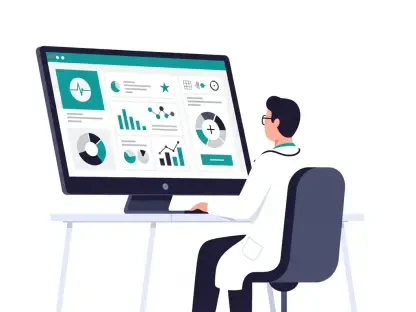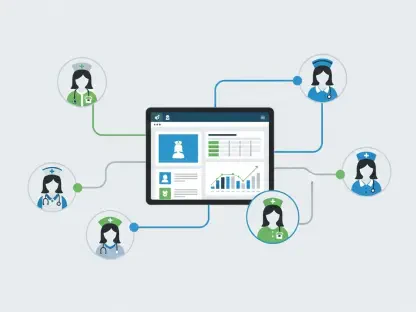The healthcare logistics market is currently valued at an incredible USD 184.43 billion and is projected to grow significantly in the coming years. As the demand for pharmaceuticals and medical devices continues to surge, the logistics sector faces both challenges and opportunities. This article explores how healthcare logistics is poised to evolve to meet this rising demand.
The Driving Forces Behind Rising Demand
The Surging Need for Pharmaceuticals and Medical Devices
The healthcare industry is grappling with a significant uptick in demand for both pharmaceuticals and medical devices. This surge is largely due to the increasing incidence of chronic diseases and the growing complexity of treatment protocols. As companies push to broaden their product portfolios, logistics must innovate to keep pace. The growing diversity of medical products has introduced new complexities into the supply chain, requiring advanced capabilities to manage various shipping and storage requirements.
Adding to the complexity is the global nature of healthcare logistics. Pharmaceuticals and medical devices often involve multinational supply chains, requiring a seamless integration of transport modes and compliance with stringent international regulations. This global interconnectivity demands robust systems capable of tracking shipments in real-time, ensuring that products reach their destinations without delays or quality degradation. Consequently, the logistics sector is investing substantially in technologies and partnerships to enhance operational efficiencies and address these evolving requirements.
The Role of Chronic Diseases
Chronic diseases such as diabetes, cardiovascular conditions, and respiratory disorders are on the rise globally. This has led to an urgent need for sophisticated medical devices and specialized pharmaceuticals that can manage these conditions effectively. As a result, the logistics network needs to be agile and robust to ensure timely and safe delivery. The prevalence of chronic diseases creates a continuous demand for medical supplies, necessitating a well-equipped infrastructure to cater to these long-term healthcare needs effectively.
Moreover, the treatment protocols for chronic diseases often involve a combination of various medicines and medical devices, further complicating the logistics requirements. The necessity for consistent and reliable delivery systems cannot be overstated, as delays or disruptions can significantly impact patient outcomes. Logistics providers must ensure that their networks are resilient and capable of adapting to the fluctuating demands of chronic disease management, underscoring the role of strategic planning and advanced logistics solutions in meeting these critical healthcare needs.
The Importance of Temperature-Controlled Logistics
Ensuring Safe Delivery of Temperature-Sensitive Products
With the advent of innovative therapies and vaccines, many healthcare products now require stringent temperature controls during transportation and storage. The demand for cold chain logistics has never been higher, and logistics providers are investing heavily in technology and infrastructure to meet this need. The rise in biologics, specialty drugs, and personalized medicines, which often require precise temperature conditions, underscores the importance of maintaining the integrity of temperature-controlled supply chains.
Maintaining the cold chain involves complex logistical processes, including advanced refrigeration units, insulated packaging, and real-time temperature monitoring systems. These technologies are crucial in ensuring that temperature-sensitive products remain within prescribed temperature ranges throughout their journey, from manufacturing facilities to patients. The high stakes associated with these healthcare products demand a meticulous approach to logistics, combining technological advancements and process rigor to safeguard product quality and efficacy.
Challenges in Temperature-Controlled Logistics
Maintaining the required temperature for sensitive healthcare products throughout transit is fraught with challenges. From advanced refrigeration units to real-time monitoring systems, the industry is leveraging technology to overcome these hurdles. However, it remains a complex and costly aspect of healthcare logistics. Additionally, variations in infrastructure quality and regulatory standards across different regions add layers of complexity to managing temperature-controlled logistics networks globally.
Logistics providers must navigate these challenges by employing robust risk management strategies and ensuring compliance with stringent regulations. Investments in cutting-edge technologies and partnerships with specialized service providers are essential for maintaining the effectiveness of cold chain logistics. Despite these efforts, factors such as unexpected delays, handling errors, and equipment malfunctions can pose significant risks, necessitating continuous improvement and innovation in temperature-controlled logistics practices.
Innovations and Technological Advancements
Leveraging AI and Big Data in Logistics
Artificial Intelligence (AI) and Big Data are revolutionizing healthcare logistics. AI-driven route optimization, predictive analytics, and automated warehousing solutions are making the supply chain more efficient. Big Data enables real-time tracking and analytics, ensuring that products are delivered timely and safely. These technological advancements allow for better forecasting and demand planning, reducing the likelihood of stockouts or overstocking and enhancing overall supply chain efficiency.
Moreover, the integration of machine learning algorithms in logistics operations enables continuous learning and improvement. By analyzing vast amounts of data, these systems can identify patterns and trends, facilitating proactive decision-making and optimizing resource allocation. The use of AI and Big Data not only enhances operational efficiencies but also significantly contributes to cost reduction and improved service levels, making it an indispensable component of modern healthcare logistics.
Enhancing Supply Chain Transparency
Transparency in the supply chain is critical for maintaining product integrity and compliance. Advanced tracking systems and blockchain technology are being employed to ensure end-to-end visibility, from production to delivery. This not only ensures compliance with stringent regulations but also builds trust among stakeholders. The ability to trace every step of the supply chain process enhances accountability and allows for swift identification and rectification of any issues that may arise.
Blockchain technology, in particular, offers a tamper-proof and decentralized way to record transactions and movements. This ensures that all parties involved have access to a single, verifiable source of truth, enhancing trust and credibility. By providing a transparent and immutable record, blockchain can help mitigate risks associated with counterfeiting, fraud, and supply chain disruptions, ultimately contributing to a more secure and efficient logistics framework for healthcare products.
The Role of a Clinically Integrated Supply Chain
Bridging the Gap Between Clinicians and Supply Chain Specialists
A clinically integrated supply chain combines clinical expertise with logistics efficiency to optimize patient outcomes. By involving clinicians in supply chain decisions, healthcare providers can ensure that the right products are available when needed, thus improving patient care and reducing costs. This collaborative approach enhances the alignment between clinical needs and supply chain capabilities, fostering a more responsive and adaptive healthcare delivery system.
Clinicians provide valuable insights into patient needs and treatment protocols, which can inform better supply chain planning and execution. Their involvement ensures that logistics operations are patient-centric, prioritizing the timely and accurate delivery of essential medical supplies. This symbiotic relationship between clinicians and logistics specialists enhances overall healthcare outcomes and reinforces the importance of a holistic approach to supply chain management.
Benefits of Clinical Integration
Effective integration of clinical data with logistics can significantly enhance decision-making processes. This approach ensures that healthcare products are not only delivered efficiently but also meet the specific needs of patients, thereby driving better health outcomes and cost efficiency. By leveraging clinical data, logistics providers can forecast demand more accurately, customize delivery schedules, and optimize inventory management, ultimately leading to improved service levels and patient satisfaction.
Moreover, clinical integration enables a more proactive approach to healthcare delivery, anticipating patient needs and ensuring that necessary medical supplies are readily available. This reduces the risk of treatment delays and enhances the overall quality of care. The fusion of clinical expertise with logistics capabilities not only streamlines operations but also fosters a more patient-centered healthcare system, emphasizing the critical role of integrated supply chain strategies in achieving optimal health outcomes.
Regional Dynamics and Market Segmentation
North America’s Dominant Role
North America, particularly the United States, holds a significant share of the global healthcare logistics market. With a well-established healthcare infrastructure and a high prevalence of chronic diseases, the region demands advanced logistics solutions. The U.S. also serves as a major exporter of medical products, further driving logistics needs. The robust healthcare system, coupled with significant investments in research and development, positions North America as a leader in healthcare logistics innovation and implementation.
The presence of major pharmaceutical and medical device manufacturers in the region further amplifies the need for efficient logistics systems. These companies require reliable and scalable logistics solutions to support their extensive production and distribution networks. As a result, logistics providers in North America are continually evolving their services to meet the growing demands and maintain their competitive edge in the dynamic healthcare market.
Europe’s Growing Market
Europe is another critical player in the healthcare logistics market. The region is focused on cost-effective logistics solutions to meet diverse healthcare needs. The pandemic has underscored the necessity for a robust supply chain to ensure a steady supply of essential medical products. European countries have been investing in enhancing their logistics infrastructures, emphasizing the importance of efficiency, reliability, and scalability in their healthcare supply chains.
The fragmented nature of the European market, with its diverse regulatory environments and healthcare systems, presents unique challenges and opportunities for logistics providers. By adopting innovative approaches and leveraging emerging technologies, logistics companies can navigate these complexities and deliver tailored solutions that meet the specific needs of different countries. The focus on sustainability and regulatory compliance further drives advancements in healthcare logistics, positioning Europe as a key player in the global market.
Competitive Landscape and Key Players
Market Leaders and Their Strategies
Companies like AmerisourceBergen, FedEx, and Deutsche Post DHL are significant market players. These companies are focusing on strategic mergers, acquisitions, and technological innovations to maintain their competitive edge and enhance their capabilities in healthcare logistics. Through collaborations and partnerships, they are expanding their reach and leveraging synergies to offer comprehensive solutions that address the evolving needs of the healthcare sector.
The emphasis on innovation is evident in the continuous development and deployment of advanced technologies, such as automation, AI, and blockchain, which enhance operational efficiencies and service quality. These market leaders are also investing in sustainability initiatives, recognizing the importance of environmentally responsible logistics practices in the healthcare industry. Their strategic focus on growth, innovation, and sustainability underscores their commitment to shaping the future of healthcare logistics.
Recent Developments in the Industry
The healthcare logistics market, currently valued at an astounding USD 184.43 billion, is expected to see substantial growth in the foreseeable future. This expansion is driven by the increasing demand for pharmaceuticals and medical devices. As the healthcare sector evolves, logistics companies face both significant challenges and exciting opportunities. The rising demand necessitates innovative solutions in storage, transportation, and distribution to ensure efficiency and safety. Advancements in technology, such as automation and real-time tracking, are playing a crucial role in this transformation. Furthermore, the need for specialized logistics services, particularly for temperature-sensitive products like vaccines and biologics, is becoming more pronounced. Companies must adapt to stringent regulations and ensure compliance while also focusing on sustainability. The trend towards personalized medicine and home healthcare adds another layer of complexity and specialization to logistics operations. This article delves into how the healthcare logistics industry is gearing up to meet these growing demands, ensuring quality and timely delivery of essential medical products.









